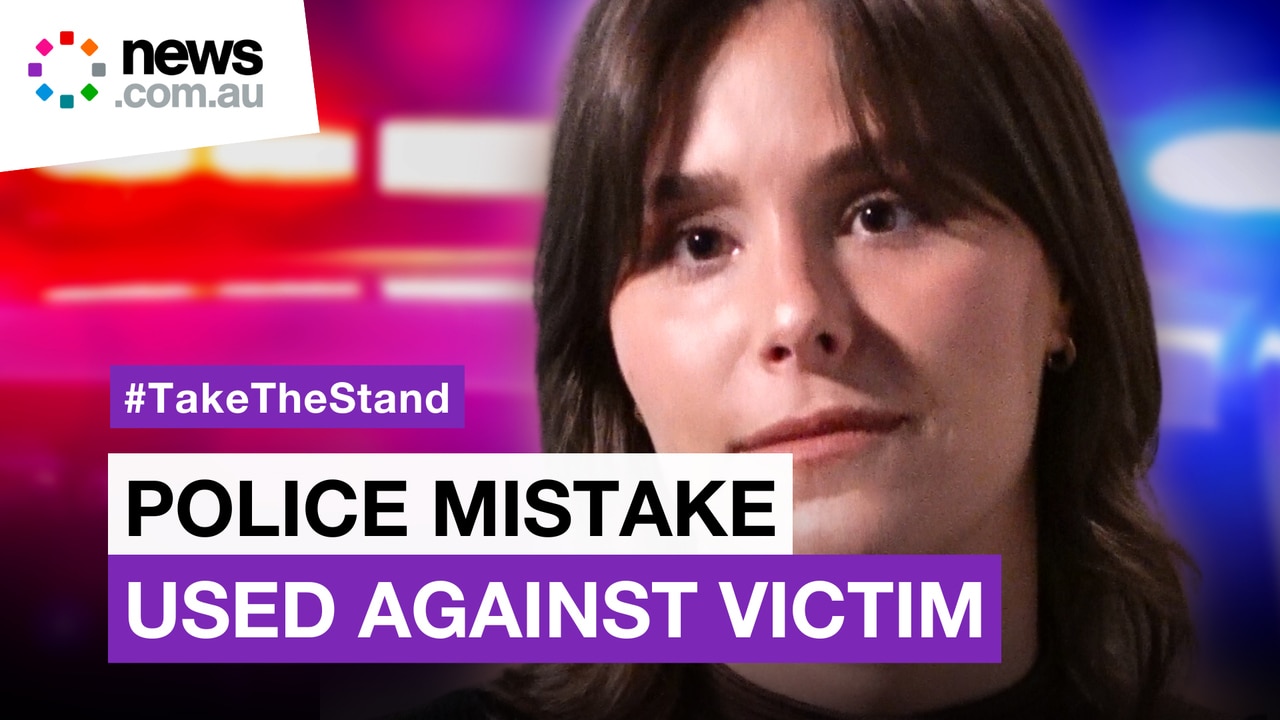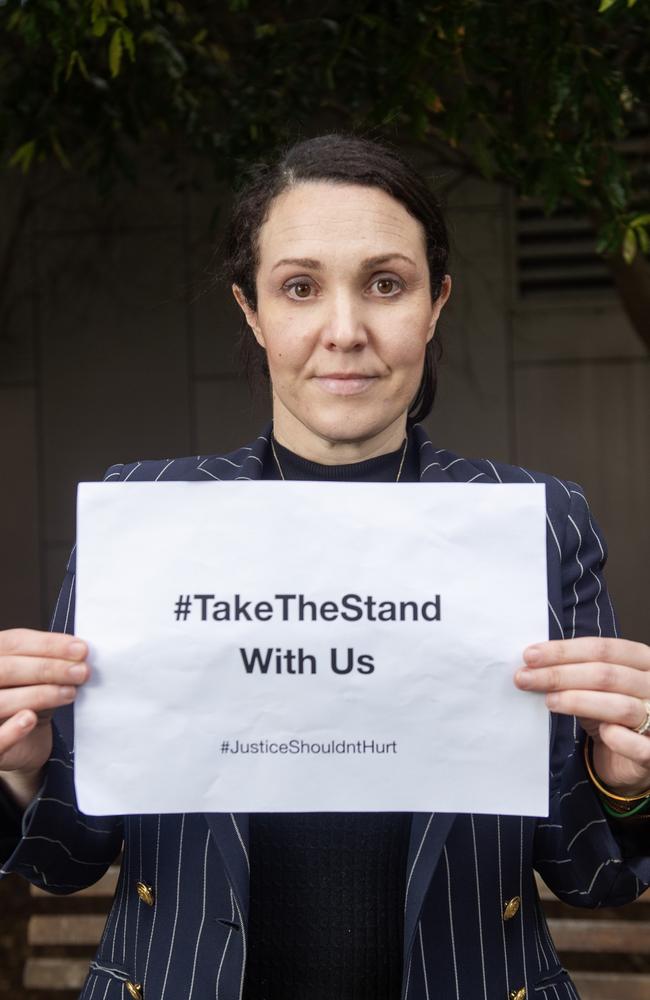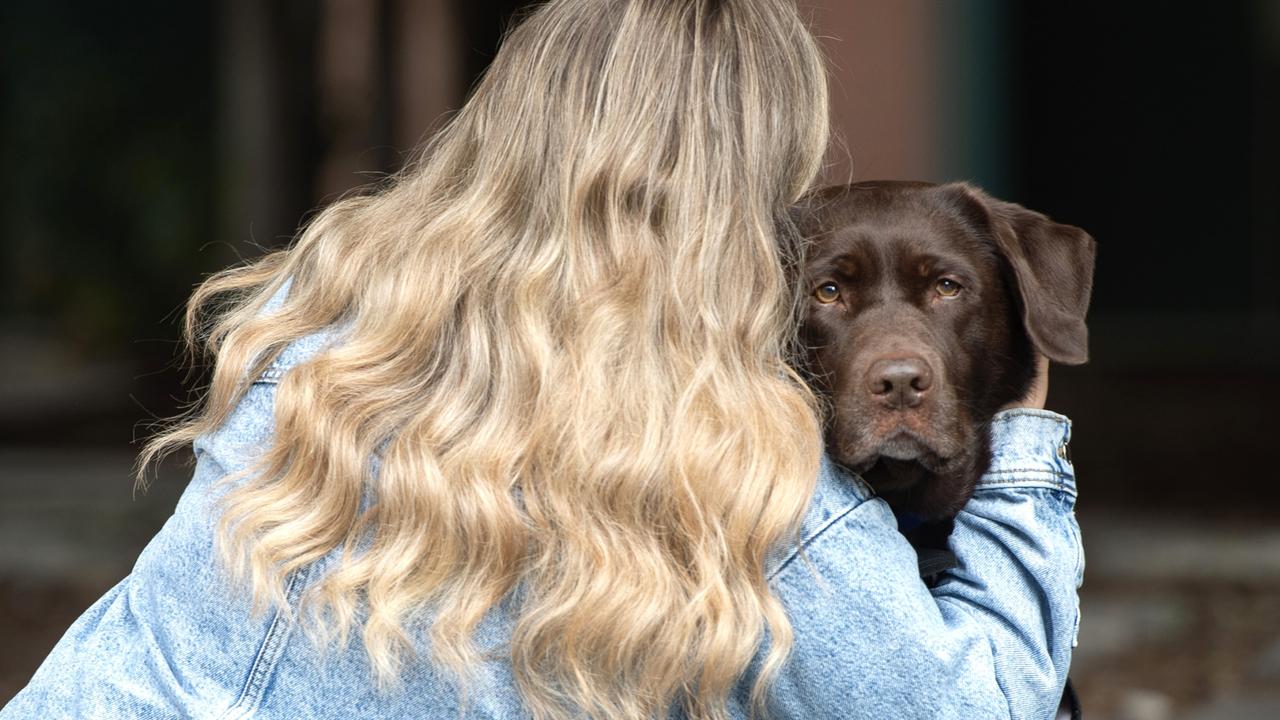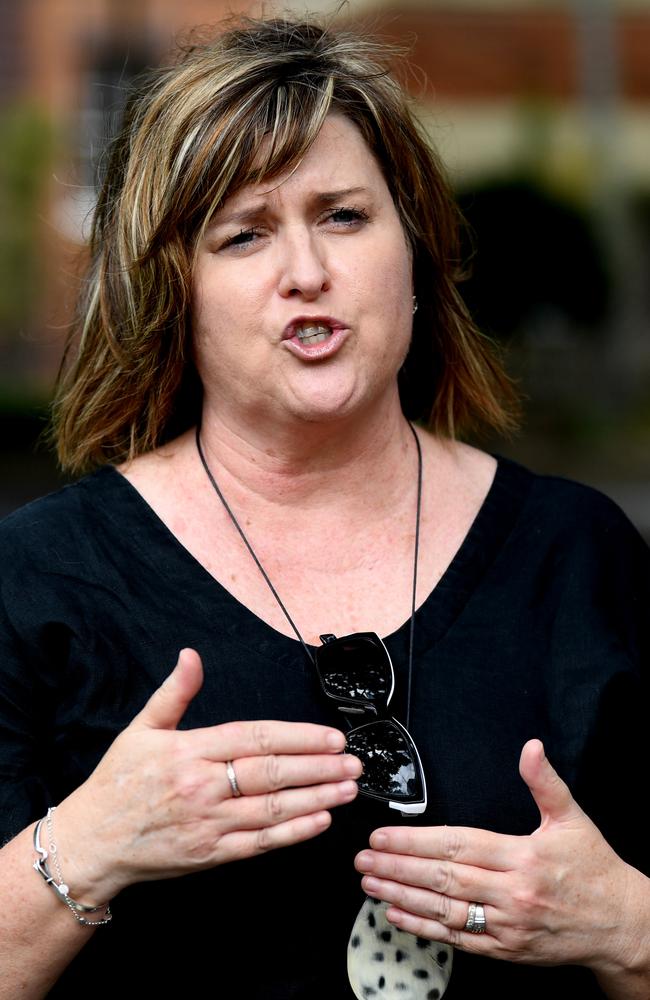#TakeTheStand campaign to make system less traumatic for sexual assault survivors
Today, news.com.au is launching the #TakeTheStand campaign to fight for Australia’s sexual assault survivors. Here’s what you need to know.

For the past three years, independent journalist Nina Funnell has been following 20 individuals who made a report of rape through their experience with the criminal justice system.
As this series will show, the results were shocking.
Every individual – including every survivor whose offender was found guilty – states that they left the system more traumatised than when they entered it.
But it doesn’t have to be this way.
Sign the petition and #TakeTheStand with us
There are simple, proven, cost effective things which governments can be doing right now to make the system less traumatic for sexual assault survivors.
Some are simple, practical solutions, like having entrances and separate waiting areas in courts so survivors don’t have to sit with their offenders before a hearing begins. Then there are more comprehensive solutions, including programs proven to reduce stress and confusion, minimise delay and prevent unnecessary re-traumatisation.

Crucially, none of these programs impact on the rights of the accused.
Building on the success of our sister-campaigns with Ms Funnell – including #JusticeShouldn’tHurt and #LetHerSpeak/LetUsSpeak – #TakeTheStand is now calling on everyday Australians to stand up for a fairer system for all.
“When victim-survivors take the stand, they often do so at great personal cost,” says Ms Funnell. “Of the 20 women and men who I followed, not one came forward out of malice, money or revenge. Every single one was driven by a shared common purpose: to protect the community, to make the streets safer, to prevent someone else from living their nightmare.
“These brave individuals took the stand for us. Now it’s our turn as a community to Take the Stand for them and insist on a fairer system that does not further harm.”
The Justice Shouldn’t Hurt wheel explained
After speaking to survivors, experts, advocates, academics, frontline services and lawyers, we have pulled together eight areas of reform which we are spotlighting through this campaign. Each are explained in more detail below.
1. Faster Forensics
Sexual assault survivors in regional, rural and remote areas often face long delays in accessing timely rape kits, as not all hospitals are equipped or able to perform them. Recently, a rape survivor who presented to a regional NSW hospital was required to wait over 48 hours for a rape kit and forensic specialist to arrive from Sydney.
Survivors facing delays are often asked not to shower, drink, brush their teeth or go to the toilet, as this could degrade forensic evidence of a sexual assault. Our investigation has also found instances of victim-survivors being turned away from regional hospitals and asked to drive themselves huge distances on busy freeways – while in shock – in order to attend an alternate hospital in an often unfamiliar city.
Certain jurisdictions also continue to face backlogs of untested rape kits. This extends the indignity and trauma of the assault.
Joining with We Gotchu Girl, a survivor-led community campaigning group from regional Australia which first launched its faster forensics campaign in February 2024, news.com.au is calling for governments across Australia to review wait times and address the availability of rape kits, staffing and training gaps and forensic testing backlogs.
2. Justice Navigators
The criminal justice process is often long and lonely, with frequent delays, radio silence and a revolving cast of support people. The result? Survivors often have to repeat their stories as they are passed through multiple sets of hands. They can feel lost and alone, and many disengage or consider disengaging from the process, as their pre-existing feelings of powerlessness, helplessness and voicelessness are reactivated.
Justice Navigators break the isolation – located within sexual assault services, these trained specialists accompany victim-survivors throughout their entire justice journey.
They support survivors to understand and exercise their rights and help them navigate the complex range of support, recovery and justice options available to them, including by attending court and hearings. They advocate, answer questions and provide ongoing support to survivors that isn’t tied to any one legal pathway or outcome.
Since 2007, survivors in England and Wales have had access to this form of support (called Independent Sexual Violence Advocates), and evaluations show the model has been hugely successful. Research revealed the program halved the number of survivors who dropped out of legal procedures.

In May 2024, the Victorian government announced funding for Australia’s first Justice Navigator pilot to ensure survivors of sexual violence can more easily navigate support, recovery and justice options.
Full Stop Australia and survivor-advocates are now calling for other states and territories to get on board.
3. Independent Legal Representation
Many sexual assault survivors are surprised to learn that the prosecution’s job is to represent “the state” – not the individual victim-survivor. In most criminal proceedings, no one is legally responsible for representing the rights or interests of the victim: the defendant is represented by the defence, the community is represented by the prosecution, but no one represents the victim-survivor.
Independent Legal Representation (ILR) would ensure that victim-survivors are afforded their own lawyer to advise them on specific issues, and explain the legal process. The lawyer is independent of the prosecutor and prioritises the victims’ interests.
This can break down feelings of isolation and help the victim-survivor to feel confident communicating with the prosecution and others.
According to advocacy group With You We Can, this helps to uphold victims’ rights and can enhance their confidence in the system.
Many other countries already afford ILR in sexual offence matters, including Canada, Sweden, Norway, Germany, India, Japan and Ireland – among others. Victims who access ILR in these places voice experiencing a greater sense of procedural justice; they are more likely to report to police and stay engaged in the legal process.
Australia currently offers ILR in a limited form in NSW and Queensland. In 2024, the federal government began funding pilot ILR programs in Victoria, Western Australia and the ACT.

4. Counselling Protections
Defendants in sexual assault cases commonly try to access the private counselling notes of victims-survivors and in some cases they are even granted access to therapy session recordings or transcripts.
This can have a devastating impact. It violates privacy and confidentiality, it can destroy trust between a survivor and their treating professional, it can undermine public confidence in critical mental health services, and it can exacerbate feelings of violation, fear, powerlessness and helplessness.
This can amplify trauma and destroy psychological safety. Many survivors choose not to return to therapy, leaving them without critical support at a time they may need it most.
When counselling notes are admitted into court, they are often weaponised in paradoxical ways.
Trauma symptoms which might be the result of violence can be used to discredit the survivor.
For example, if the victim is having nightmares, flashbacks, panic attacks or intrusive thoughts, this can be used to suggest they have an unstable memory and trouble discerning reality from imagination.
If the person has any mental health diagnoses, this can be used to question the person’s mental stability.
NSW introduced counselling-note protections in 1997 after a rape crisis counsellor was jailed for refusing to hand over a client’s counselling notes, sparking national debate.
The NSW laws were updated again in 2010. But as our long-term investigation will show, those protections are not working as intended in practice.
Robust privacy protections are now urgently needed in all Australian jurisdictions to prevent further harm.
5. Court support dogs
Court is often a frightening, overwhelming experience for sexual assault survivors, especially children who are not permitted to hold anyone’s hand or receive physical comfort while giving evidence, for fear of coaching.
Court support dogs are trained from puppies to remain calm under chaotic and stressful conditions. These working dogs accompany victim-survivors through their journey with the criminal justice system, offering calm, compassionate care. This helps to soothe and ground the victim while they give evidence or wait in stressful situations.
These dogs complete their Public Access Test, and often receive more training than Guide Dogs, as they are required to work with multiple clients across their working lives.
Studies show that the presence of a court support dog can reduce a person’s cortisol levels, blood pressure, stress and heart rate, while increasing oxytocin levels. The combination allows the person to think calmly, access memory, and give clearer, more consistent evidence.
Research shows that survivors also take fewer breaks on the stand when supported by a court dog, and this saves the court significant money.
A recent evaluation of the Victorian OPP Court Dog program found that if the Court Dog saves even half an hour per hearing, the program is cost neutral.
The Victorian evaluation found the program had been hugely successful with survivors, judges and others in the justice system.
Over 90 per cent of surveyed survivors described the program as “helpful” and “grounding”. Interestingly, 93 per cent of victim-survivors also reported feeling less overwhelmed and less stressed waiting in the lead up for trial, just knowing a dog had been booked for the big day.
However, demand far exceeds capacity, and not all survivors who request access to the program are granted it.
The program requires further investment so it can expand to help more people.
Court dogs were first introduced in Australia in 2016, but have been working in courts around the world, including in the USA and Canada, since 2004.

6. Specialist Courts/Specialist Court Features
Architectural design choices can have a profound impact on how a vulnerable person experiences a space. Specialist courts are designed with this in mind. Practical elements, such as having separate entrances, exits, toilets and waiting areas can safeguard a victim-survivor from running into their offender outside of court.
Specialist courts (or courts which integrate specialist features) can significantly reduce trauma for all involved.
Currently, it is not uncommon for sexual assault cases to spend two to three years in the criminal system. During this time, victim-survivors have their lives put on hold while they await trial. Memory evidence can degrade, witnesses can drop away and a turnover of staff in prosecution, police and support services means survivors are often passed through multiple extra sets of hands.
Specialist courts or separate court lists reduce delays so matters get on in under six months. Other specialist court features include specialist training for all personnel including judges, court staff and legal representatives, the option to prerecord evidence, access to witness intermediaries (for anyone with a complex communication need, regardless of age), improved judicial case management and other trauma-informed resources and facilities.
These features collectively reduce stress and retraumatisation, and can improve justice outcomes for all.
7. Human Rights for Victim-Survivors
In the criminal justice system, the rights of the accused are prioritised, while the rights of the victim-survivor are often given little focus or attention. In jurisdictions where there are Human Rights Acts, the accused’s rights are specifically protected within the criminal process. By contrast, the human rights of the victim-survivor can be overlooked, with basic protections including the right to procedural fairness missing.

Across Australia, Victims’ Rights Charters are neither consistent nor legally enforceable.
In response, peak body Queensland Sexual Assault Network and other experts and advocates, including lawyer Karen Iles, have called on governments to address these gaps through amending Human Rights Acts so that they specifically recognise the rights of sexual assault victims within criminal justice processes.
Human Rights Acts also require judges to interpret the law and parliaments to make legislation consistent with the Act. When there is no specific protection for victims’ rights within these acts, victims’ rights are less likely to be considered in judicial decision making and in the development of future legislation. Over time, this can result in a system even more weighted towards the rights of the accused.
8. Long haul support
Working to prevent sexual violence is a key priority. Working to support those who have been impacted by it is another.

Robust funding for specialist sexual assault services and other frontline services is urgently needed.
The Australian Child Maltreatment Study estimates that slightly more than one in four (28.5 per cent) Australians aged 16 and over have experienced child sexual abuse. The ABS estimates that one in five Australian women (22 per cent) have experienced sexual assault since the age of 15. Taken together, these statistics are sobering.
Yet for every 100 people who experience sexual assault or abuse in Australia, only eight will report to police. Of them, only one will receive a guilty verdict.
Regardless of whether a victim-survivor has reported to police, any sexual assault survivor may experience trauma impacts across their lifetime.
While less than 10 per cent of survivors will lodge a complaint within our criminal justice system, almost all will continue to interact with Australia’s healthcare system, and this represents an important opportunity for support.
Accordingly, experts have called for all healthcare professionals and those who work in related fields (such as aged care) to be upskilled and trained in trauma-informed care, as these professionals are frequently coming in casual contact with survivors.
Holistic long haul support means providing all victim-survivors with specialist, trauma informed healthcare, counselling and other support options throughout their entire recovery.
Nina Funnell is Walkley Award winning journalist and the creator of the Take the Stand campaign run in exclusive partnership with news.com.au. Contact: ninafunnell@gmail.com



